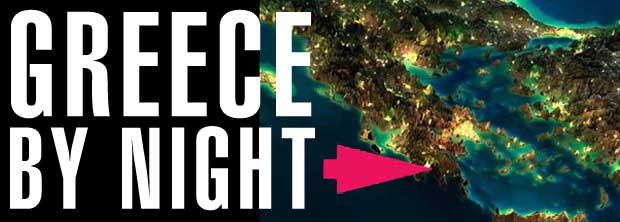Dimitrios Ioannidis
March 13, 1923 – August 16, 2010
A pivotal figure in the downfall of the Greek Junta
Ioannidis' 1973 coup
When Junta leader Georgios Papadopoulos (sometimes called in the international press "The invisible dictator") began a shift in his rule in 1973 toward a liberalization of the tightly-controlled media and social life of Greece, with a stated goal of free elections, Dimitrios Ioannidis acted.
Ioannidis was the head of the ESA military police which operated from Papagou, a suburb outside of Athens. Ioannidis led the coup which successfully removed Papadopoulos on November 25, 1973, followed by Ioannidis placing his friend General Phaedon Gizikis as President of Greece.
With this maneuver, Ioannidis triggered the beginning of the end of the "junta" era in Greece which had started with the April 21, 1967 revolution brought about by "the colonels;" a group consisting of 12 Army officers primarily led by Georgios Papadopoulos, Stylianos Pattakos, and Nikolaos Makarezos.The Junta of the Colonels
In 1967, the coup action of the Colonels was just one of numerous plots brewing in this chaotic period of political life in Greece. Conspiring on all sides picked up momentum when Constantine II (born in Athens in 1940, and sometimes called Constantine XIII), who had only just become King of Greece in 1964 (coming to the throne on the death of his older brother Paul), dismissed George Papandreou (father of Andreas Papandreou, Grandfather of the more current George Papandreou) in 1965 from the Prime Minister's office.*
Though there were various counter-coups attempted against the Colonel's Junta, only Ioannidis' effort of 1973 succeeded. Initially, it was hoped that he would be able to solve the growing crisis with Turkey over the status of Cyprus and Aegean territory rights (that is, to the satisfaction of the Greeks) but his administration instead took all the worst elements of the Colonel's rule and exaggerated them. This served to ostracize the dwindling number of allies inside and outside of Greece and severely limiting this second military dictatorship any legitimacy.Ioannidis' downfall
Ioannidis was undone on July 15, 1974, when he attempted to execute a coup on Cyprus in an effort to unite the island with Greece (a political ideal called "enosis" long held by factions in Cyprus and Greece), and to exclude the governor ("Ethnarch") of the island, Greek Orthodox Archbishop Makarios. The two-stage plan only moved through the first stage when the action was used as a pretext by the Turkish military to invade Cyprus on July 20th, as Turkey was a guarantor of the 1960 Cypriot constitution and had threatened a military occupation "solution" in the past. Though Ioannidis mobilized Greek forces for war, he never committed them, and worked hard to prevent angry Greek army forces in Thrace from crossing the Evros river into Turkey proper (according to Taki Theodoracopulos’ book Upheaval in Greece, 1978, Caratzas Brothers). Alternatively, it is claimed that Ioannidis commanded the Thrace commanders to cross the Evros, though they refused (according to William H. McNeill's Metamorphosis of Greece since World War II, University of Chicago Press, 1978, page 132).
Shortly thereafter, with Ioannidis being held responsible by most Greeks - and importantly, the Greek military - for the collapsing conditions in both Greece (inflation was at 30%) and Cyprus, his "hidden" power and support from the civil and military society of Greece had evaporated.
On July 23, 1974, President Phaidon Gizikis announced the effort to form a coalition government. That night, 67-year old ex-Premier Constantine Karamanlis returned from self-imposed exile in Paris (Karamanlis had fled Greece after the 1963 election of the Center Union under George Papandreou), and was sworn in at 4:15 a.m. The problematic political revival of democracy in Greece was under way.
The Junta leaders, including Ioannidis himself, never made protective arrangements for their legal status vis-a-vis their coup actions in the past. Ioannidis was arrested on January 14, 1975.
Ioannidis sentenced to death
Eventually, Ioannidis was sentenced to death for his role in the 1967 coup and for his actions in the Polytechnic University debacle on November 17, 1974, that resulted in 24 deaths. Ioannidis’ death sentence was later commuted to life imprisonment at Korydallos Prison. He died August 16, 2010, in a hospital after being taken from his jail cell in response to complaints of troubled breathing.
Junta member Styionos Pattakos was released in 1990 and is still alive.
*Ironically, it is the government of Andreas Papandreou which officially stripped Constantine of his Greek citizenship in 1992, following a series of disputes over ownership of royal properties in Greece, among other disagreements.
New York Times bio obituary on Ioannidis:
"News of his death came from European news reports that said he died in a hospital after experiencing breathing problems in his prison cell. He was serving a life sentence for treason.
Mr. Ioannidis (pronounced ee-o-ahn-EE-dis) held tightly to a belief that patriotism and honesty were in short supply among civilian Greek politicians. It was this conviction that impelled him to become part of the “colonels’ coup” in 1967 as a young lieutenant colonel himself.....
...Mr. Ioannidis became convinced the military government and the civilian partners it had installed had become too liberal. He was the principal organizer of a countercoup by younger officers against President George Papadopoulos..."
Related:
Cartoons in Greece as the Junta years ended



Greece's Golden Visa program
Advertisement: I am an Amazon affiliate
Original page Aug 18, 2010 | Updated July 2024
